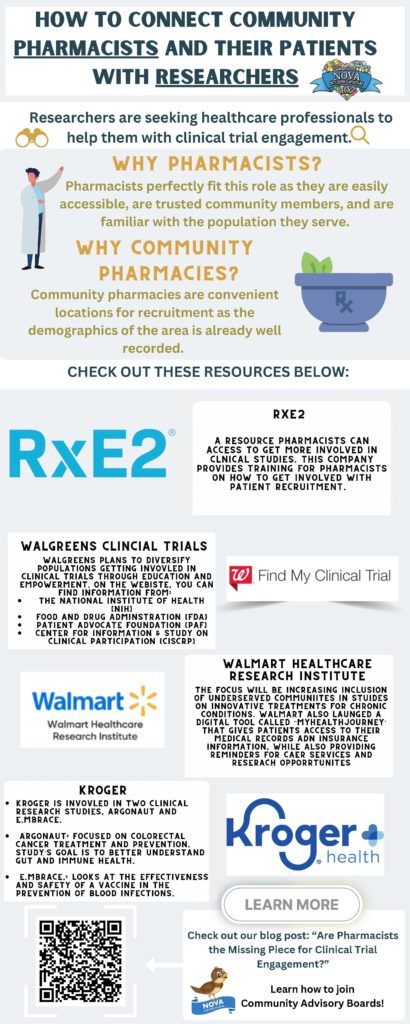Pharmacists and Clinical Trials
November 1, 2024

Are Pharmacists the Missing Piece for Clinical Trial Engagement?
According to a Gallup Poll on the public’s views of honesty and ethical standards of a variety of occupations, pharmacists have been perceived to be one of the most trusted professionals according to the public in the United States for the past decade. Specifically, pharmacists ranked in the top three with nurses and medical doctors in honesty and ethical values. This trust has people asking if pharmacists should play a more significant role in care management and research (Kristen, 2021). Pharmacists work in diverse settings beyond community pharmacy, such as primary and ambulatory care. Not only are pharmacists the most accessible member of the healthcare team, but they are also the most frequently visited member. This is especially important for many underserved areas where healthcare access is limited. In the United States, 90% of the population lives within 5 miles of a pharmacy, with over 28,000 community pharmacies located in federally recognized underserved communities (American Pharmacists Association, 2022.). There are about 270 million patient visits to a pharmacy each week and 13 billion visits to a pharmacy per year (California, 2022). Pharmacists have filled the many gaps in healthcare, but can they also be a potential solution in improving clinical trial engagement?
Recruiting patients and retaining them for the length of a trial has always been challenging. As requirements have been placed to increase the diversity of samples in clinical research studies [ 2023 Omnibus Spending Bill-Public Law 117-328 ], researchers are seeking healthcare professionals to help them with clinical trial engagement. Pharmacists perfectly fit this role as they are easily accessible, are trusted community members, and are familiar with the populations they serve. Community pharmacies are convenient locations for recruitment as the demographics of the area are already well-recorded (Sine, 2021). Increasing recruitment of racial and ethnic minority patients can be readily facilitated as pharmacies serving certain populations of interest can be prioritized by researchers. The first step in utilizing community pharmacies is to ensure that pharmacy information systems accurately collect race and ethnicity for all patients. Pharmacy professionals could gather this information and work with research stakeholders (government agencies, funders, research organizations, patient advocate groups, etc.) to facilitate the sharing of information that would allow researchers to identify qualifying patients for clinical trials (Hippensteele, 2023).
On top of providing demographic breakdowns, pharmacists can also educate their patients on the importance of being involved in clinical studies. The lack of diversity and inclusion in clinical trials has created gaps in understanding conditions and diseases, treatment effectiveness across populations, and even preventive factors. Healthcare providers are unable to develop the optimal treatment regimen for a specific population or even provide counseling on risk factors and prevention strategies. For studies to be generalizable, clinical trial participants should adequately reflect the diversity of the real-world population. Diversifying clinical trials is not limited to ethnicities but must include sexual and gender minority populations and socioeconomic statuses. A recent example of the importance of inclusion in clinical trials is during the COVID-19 pandemic. Racial and ethnic minority populations (including African Americans, Hispanic/Latino, American Indian/Alaska Native, and Native Hawaiian and Pacific Islander) were disproportionately affected. These population groups had increased cases, hospitalizations, and even deaths. This further emphasizes why it was critical for the vaccine trials to accurately represent the population impacted to see the vaccine’s effectiveness and safety across all racial and ethnic groups (National Institute of Health, 2023).
The most difficult challenge pharmacists will face is countering mistrust in clinical research based on horrific historical events. Is the public’s trust in pharmacists enough to overcome the fear minority populations have of clinical trials? Pharmacists can provide education on how studies involving humans now must go through an approval process by a committee that specifically focuses on the ethics of a proposed study and ensures the protection of people who participate in the study. These committees are often called Institutional Review Boards (IRB) or Human Ethics Review Boards (HERB). In the US, federal law called the Common Rule, specifies the ethical principles and guidelines that must be in place to protect research participants. Pharmacists and other community members need to rebuild trust through transparency. Taking time to listen to the community’s concerns can be an important way to improve trust. During the COVID-19 pandemic, pharmacists were able to administer over 300 million vaccines (which is more than half of all COVID-19 vaccinations administered in the US) despite the conspiracy theories and mistrust during this time (Grabenstein, 2022). The public’s familiarity with their pharmacists helped encourage many people to get vaccinated as pharmacists were vocal about the vaccine’s benefits. There also needs to be an emphasis on the benefits of getting involved in studies. Participating in clinical trials can significantly benefit their community by helping researchers learn the most efficacious medications for that specific group. By increasing the diversity of individuals enrolled in clinical research studies, the health outcomes of minority populations stand to improve greatly.

Many pharmacists do not know how to get involved in clinical research advocacy. There are many efforts underway to connect community pharmacists and their patients with researchers:
RxE2: This company provides training for pharmacists on how to get involved with patient recruitment. Over time, it is anticipated that pharmacies will get more involved with clinical research as federal and state pharmacy laws create requirements for investigational drugs used for research to be properly labeled similarly to prescriptions and include a consultation with the pharmacist instead of just being delivered directly to the patient’s home (Borfitz, 2022).
Walgreens: With the creation of the “Walgreens Clinical Trials” initiative, Walgreens plans to diversify populations getting involved in clinical trials through education and empowerment. On their website, Walgreens also provides information on how to engage with clinical trials and resources from the National Institute of Health (NIH), Food and Drug Administration (FDA), Patient Advocate Foundation (PAF), and Center for Information & Study on Clinical Research Participation (CISCRP) (Walgreens, n.d.).
Walmart: Walmart recently launched the Walmart Healthcare Research Institute (WHRI). The initial focus will be increasing the inclusion of underserved communities in studies on innovative treatments for chronic conditions. Walmart also launched a digital tool called ‘MyHealthJourney’ that gives patients access to their medical records and insurance information, while also providing reminders for care services and research opportunities (Walmart Inc., 2022).
Kroger: As one of the largest grocery chains in the country, Kroger has already been involved with recruitment for clinical trials, specifically with two clinical research studies, ARGONAUT and E.mbrace. The first clinical study, ARGONAUT, is focused on colorectal cancer treatment and prevention. Funded by Persephone BioSciences, this study’s goal is to better understand gut and immune health. The second clinical study, E.mbrace, looks at the effectiveness and safety of a vaccine in the prevention of blood infections. Janssen Pharmaceuticals is sponsoring this study. Kroger has more information on both studies and resources to get involved on their website (The Kroger Co., 2023).
An additional way community pharmacists can get involved in clinical research other than through large national pharmacy chains, is to join community advisory boards (CAB) focused on community-based participatory research (CBPR). Community members serve as a guide to increase representation in research activities and are viewed to be key components of successful CBPR projects. Members should represent the community involved in the study in order to provide insight into barriers and areas of vulnerability. This group is responsible for being a source of accurate information, building trustful relationships within the community, and most importantly, ensuring that their community benefits from the research conducted (Newman et al., 2011). There are many major institutions that have CABs and are looking for volunteers to join. Some of these include the Johns Hopkins Center for Health Equity, Kaiser Permanente Mid-Atlantic Permanente Research Institute, Mayo Clinic Research, and Harvard T.H. Chan School of Public Health Prevention Research Center on Nutrition and Physical Activity. The National Institute of Health (NIH) also has other ways of potential involvement. The Clinical and Translational Science Awards (CTSA) program, which is made up of scientists, patient advocacy organizations, and community members, consists of ‘hubs’ that work to create innovative solutions to barriers in research such as efficient ways to recruit research participants. A primary goal of the CTSA program is to get evidence-based treatment to more patients faster by producing a faster and smoother research process (National Institute of Health, 2021).
For pharmacists who would like to go beyond recruitment to get involved with doing research, several resources are available for training and education such as PPD’s SiteCoach and the CITI Program. These provide training for healthcare practitioners who are new to clinical research. A fast way pharmacists can get connected with research is by using the resource ResearchMatch which is a nonprofit program funded by the NIH. This program is a free resource that easily connects patients with researchers and has been a useful tool for gaining volunteers for the past decade (National Institute of Health (NIH), n.d.).
Staying up to date with research is no longer an option, but rather a necessity as of May 2018 with the passing of the Right to Try law. This law allows individuals who have exhausted all resources and are facing a terminal diagnosis to have access to brand-new drugs that have not yet been FDA-approved. The reasoning behind this law is that terminally ill patients may not live long enough to see a drug go through the lengthy process of FDA approval and then reach the market. Pharmacists now have an added responsibility to be aware of how patients can access and provide counseling on unapproved medications. By having pharmacists become more involved in the behind-the-scenes aspect of drug development, they can better educate patients about how to access them and answer questions (FDA, 2023). The pharmacists’ role is rapidly expanding as they begin to fill in areas they should have been involved in from the start.
Resources Used:
American Pharmacists Association. (2022, June). Inequity to covid-19 test to treat access – pharmacists can help if permitted . Advocacy. https://www.pharmacist.com/Advocacy/Issues/Inequity-to-COVID-19-Test-to-Treat-Access-Pharmacists-can-help-if-permitted
Borfitz, D. (2022, January 27). The emerging role of pharmacists in clinical research . Clinical Trials to the Clinic. https://www.clinicalresearchnewsonline.com/news/2022/01/27/the-emerging-role-of-pharmacists-in-clinical-research?utm_source=TrendMD&utm_medium=cpc&utm_campaign=Clinical_Research_News_TrendMD_0
California Pharmacists Association. (2022, August 30). Pharmacist 101. https://cpha.com/about/pharmacist-101-behind-the-white-coat/
FDA. (2023, January 23). Right to try . Right To Try. https://www.fda.gov/patients/learn-about-expanded-access-and-other-treatment-options/right-try
Grabenstein J. D. (2022). Essential services: Quantifying the contributions of America’s pharmacists in COVID-19 clinical interventions. Journal of the American Pharmacists Association : JAPhA , 62 (6), 1929–1945.e1. https://doi.org/10.1016/j.japh.2022.08.010
Hippensteele, A. (2023, June 9). Community pharmacies can improve clinical trial recruitment for racial, ethnic minority patients . Clinical Role. https://www.pharmacytimes.com/view/community-pharmacies-can-improve-clinical-trial-recruitment-for-racial-ethnic-minority-patients
Kristen , C. (2021, March 18). Public perceives pharmacists as some of the most trusted professionals . Clinical Role. https://www.pharmacytimes.com/view/public-perceives-pharmacists-as-some-of-the-most-trusted-professionals
National Institute of Health (NIH). (2021, August 27). About the CTSA Program . National Center for Advancing Translational Sciences. https://ncats.nih.gov/ctsa/about
National Institute of Health (NIH) . (2023, April 24). Diversity & inclusion in clinical trials . National Institute of Minority Health and Health Disparities. https://www.nimhd.nih.gov/resources/understanding-health-disparities/diversity-and-inclusion-in-clinical-trials.html
undefined National Institute of Health (NIH) . (n.d.). Make a positive impact by volunteering for research . ResearchMatch. https://www.researchmatch.org/?rm=CRAWebsite
Newman, S., Andrews, J., Magwood, G., Jenkins, C., Cox, M., & Williamson, D. (2011). Community Advisory Boards in Community-Based Participatory Research: A Synthesis of Best Processes. Preventing Chronic Disease; Public Health Research, Practice, and Policy , 8 (3), 1–6. https://doi.org/10.5888/pcd9.110291
Sine, S., de Bruin, A., & Getz, K. (2021). Patient Engagement Initiatives in Clinical Trials: Recent Trends and Implications. Therapeutic innovation & regulatory science , 55 (5), 1059–1065. https://doi.org/10.1007/s43441-021-00306-8
The Kroger Co. (2023). Clinical Trials & Research . Kroger. https://www.kroger.com/health/clinical-trials?CID=afi.pro.afi_Evergreen-CJ-Affiliates_20230303_b%3Akroger_c%3Aship_t%3Aent&cjevent=69c2b73445a711ee828c029f0a82b836&PID=100357191&cjdata=MXxOfDB8WXww
Thermo Fischer Scientific. (2023, March 24). SiteCoach . PPD Inc. https://www.ppd.com/participate-in-clinical-trial/investigators/sitecoach/
Walgreens. (n.d.). Clinical trials: Walgreens health . https://www.walgreens.com/topic/clinical-trials.jsp?cjevent=baa7357345a711ee835d97cb0a82b82a&CID=5250933&ext=100357191&PID=100357191&AID=11101111&SID=oc5A05L8E_cFrofF6SHThCWXVCQAnwsxQat4_kxRQxJFKp9NPfrFdKBJ66rNHw8S&cjdata=MXxOfDB8WXww Walmart Inc. (2022, October 11). Walmart’s Healthcare Research Institute launches with mission to improve care for underserved communities through research . Walmart’s Healthcare Research Institute Launches With Mission To Improve Care for Underserved Communities Through Research. https://corporate.walmart.com/news/2022/10/11/walmarts-healthcare-research-institute-launches-with-mission-to-improve-care-for-underserved-communities-through-research


